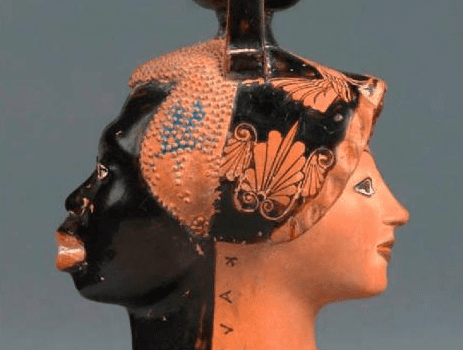Racism and antiquity


On May 25, 2020, Georges Floyd, a 46-year-old African-American citizen, died in Minneapolis, United States of America, as a result of severe police violence. In the popular and editorial turmoil that followed this tragic event, the Antiquipop website drew my attention to a distressing reality: the link between antiquity and racism, antiquity and fascism, the list goes on.
I’d like to take you on a little tour of what I’ve gleaned on the subject, from far away to closer to home.
In the Department of Greek and Roman Studies at Vassar College in New York State, the Pharos website clearly announces the color: “Pharos is a platform where classical scholars, and the public more broadly, can learn about and respond to appropriations of Greco-Roman antiquity by hate groups online.” Articles are regularly published, such as Racist Commemoration of Greco-Roman History as White HistoryJune 26, 2020 or Anti-Semites Enlist Cicero Against Anti-RacismMay 27, 2020.
Not seeking to change the minds of those who use antiquity to support their racist ideologies, the site’s contributors aim, in particular, to expose the errors, omissions and distortions that underlie the interpretations of these groups.
TheAntiquipop website decodes references to antiquity in contemporary popular culture. In June 2020, Fabien Bièvre-Perrin, PhD in History and Archaeology from the Université Lumière Lyon 2, published a post entitled Antiquité, racisme et xénophobie (Antiquity, racism and xenophobia ), in which he gives a lengthy review of online resources on the subject, in French and English.
Interested readers will find a bibliography of scientific articles and books, press articles, blog posts and, above all, numerous links to recent programs and podcasts.
On June 2, Lionel Pernet, Director of the Musée cantonal d’archéologie et d’histoire in Lausanne, published an article on LinkedIn entitled Museums, racism and the Palais de Rumine. The events surrounding the death of G. Floyd in Minneapolis prompted him to publish his paper on the decolonization of museums sooner than expected.
He concludes his analysis with the announcement of a forthcoming exhibition at the Palais de Rumine in September 2020: Exotic? ” More than 150 objects, paintings and books from all over Switzerland, dating from 1650 to 1815, will reflect the way in which Elsewhere was constructed in the Swiss collective imagination and how, in return, Switzerland was also “exotic” for the rest of Europe, with its Alpine cretins, its monsters and its wonders. A return trip that should encourage us to take a step aside and ask ourselves, again and again, whose savages we are, and what right we have to consider Others wilder than ourselves… The Museum alone will not cure us of xenophobia, but it can, along with other cultural venues, contribute to the fight against ordinary racism. .”
Here are a few resources that we can find closer to home, in our library, commented on thanks to the back covers:
To explore further, check out our Renouvaud selection!
To conclude, you will soon find on your library shelves Race: Antiquity and Its Legacyby Denise Eileen McCoskey, 2012. How do different cultures think about race? The Greeks and Romans didn’t use skin color as a basis for categorizing ethnic disparity, according to our author. This provocative book boldly explores the complex matrices of race through epic, tragedy and novel.
Also coming soon, Against the barbarians. How Antiquity can teach us about humanity by Maurizio Bettini, 2020. Our researcher investigates Greek and Latin authors to give new meaning to our conception of human rights. “I am man, and nothing human is foreign to me ”, said the Latin poet Terence.
Evelyne Barman Crotti, Unithèque website